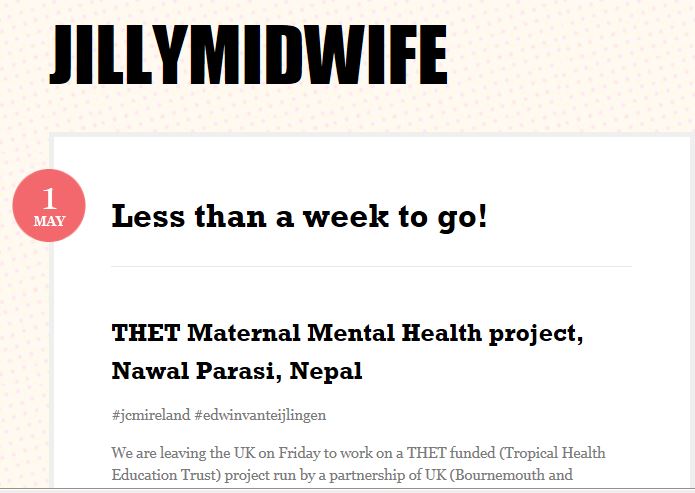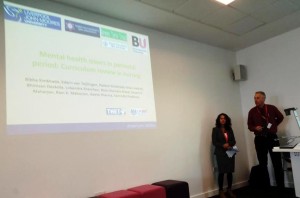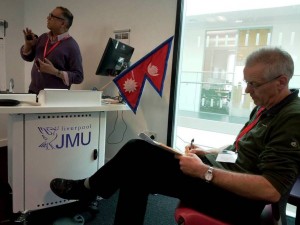
Robotics & Autonomous Systems – US leads robotics investment boom

Latest research and knowledge exchange news at Bournemouth University


The Royal Academy of Engineering invites applications for its launchpad competition. Funding aims to encourage young entrepreneurs to start a new business based on their innovation in engineering or technology, with engineering defined in its broadest sense. The competition aims to:
•improve the skills of the awardee:
•develop role models of entrepreneurship;
•bring engineering innovations to market for a wider public benefit.
Applications are open to individuals or small teams. The lead applicant must be UK-based and aged between 16 and 25. They should have a viable and commercial business proposition with a large market opportunity, and be planning to set up a business within the 18 months following the application deadline. The feasibility of the initial product or service must have been proven preferably with a basic prototype.
The winner receives the JG Gammon award, which includes a cash prize of £15,000 and a year’s membership of the enterprise hub. This provides mentoring, training and networking opportunities with UK entrepreneurs and investors. Up to two other individuals or teams may be chosen as runners up.
Click here for more information on support for entrepreneurs.
Click here for more information on the launchpad competition – now live !
Are you interested in scandal?
Most people are. And while scandal of one sort or another has long been a major part of our media diet, in recent years institutional scandals involving corporate immorality, incompetence or cover-up have assumed an increasingly prominent place, involving the banks and other commercial corporations, the churches, police forces, the media, and Parliament, amongst others. If you wonder what this tells us about contemporary society, and how we should respond to it, come to a public event at the EBC on Wednesday 11th May at 5.00 (refreshments available before the start).
In this open meeting, leading criminologist Professor Chris Greer (City University) and Lord Blair (Sir Ian Blair, former Commissioner of the Met) will discuss key issues including how the British state is responding to scandal proliferation, the implications of scandal for crime control and institutional regulation in the digital age, and the risk of scapegoating as a substitute for understanding and solving, particularly in a 24/7 news environment. Professor Ann Brooks will chair.
For more information, and to book for this free event please visit the Eventbrite website:
This is the second in a series of high profile public events at BU, called Dialogues in the Social Sciences. Organised by Profs. Ann Brooks, Candida Yates and Barry Richards, their aim is to bring insights from the social sciences to bear on major areas of current concern: higher education, crime and scandal, and violent extremism.
 Join us to take a closer look at how research can have an impact beyond academia, and the ways in which this can be achieved.
Join us to take a closer look at how research can have an impact beyond academia, and the ways in which this can be achieved.
From Monday 23 – Friday 27 May, we’ll be
exploring the various pathways to achieving
societal and economic impact through a
selection of seminars and workshops.
We will be joined by some fantastic external speakers such as Dr Steve Cross, a public engagement expert, and Bokani Tshidzu, a consultant specialising in impact evidence. At the end of the week, you are invited to take part in a celebration of research impact at Bournemouth University.
Come along to as many events as possible to explore how you can effectively engage with a variety of research users, and to find out more about methods for developing and evidencing impact.
These events are aimed at all academic staff members, early career researchers, postgraduate students and professional services staff who support impact across the university.
What’s in it for me? Impact that makes a difference outside academia and supports your career
Dr Steve Cross, Wellcome Trust Public Engagement Fellow & former Head of Public Engagement at UCL
12.30-14.00 | Talbot campus
Find out more and book now via Eventbrite
H2H – bringing research to life (Human2Human). A business networking event on the topic of virtual and augmented reality
Facilitated by Jayne Codling, Rachel Clarke and Charlene Steele
14.30-16.00 | Talbot campus
Find out more and book now via Eventbrite
Using the media to generate research impact
Nathaniel Hobby, Emma Matthews and Dr Sarah Bate
12.30-14.00 | Lansdowne campus
Find out more and book now via Eventbrite
Smart cities sandpit
Facilitated by RKEO, supported by Borough of Poole
09.30-16.30 | Lansdowne campusFind out more
Influencing public policy with research
Jane Forster and Emma Bambury-Whitton
13.30-14.30 | Talbot campus
Find out more and book now via Eventbrite
Influencing public policy with research
Jane Forster and Emma Bambury-Whitton
12.30-13.30 | Lansdowne campus
Find out more and book now via Eventbrite
Using the media to generate research impact
Nathaniel Hobby, Emma Matthews and Dr Sarah Bate
13.30-15.00 | Talbot campus
Find out more and book now via Eventbrite
Collecting evidence of research impact
Bokani Tshidzu, Chief Operating Officer of impact consultancy Vertigo Ventures
12.00-14.00 | Talbot campus
Find out more and book now via Eventbrite
Celebrating research impact at Bournemouth University
Facilitated by Dr Sarah Bate and Dr Zoe Sheppard
14.30-16.00 | Talbot campus
Find out more and book now via Eventbrite
On Friday the third cohort of UK volunteers will leave Heathrow as our education project ‘Mental Health Training for Community-based Maternity Providers in Nepal’ [1]. Mental health issues are a seriously underfunded and understudied area in Nepal, and not just in the field of maternity care. [2] Our project is a collaboration between the Centre for Midwifery, Maternal & Perinatal Health (CMMPH), Tribhuvan University (Nepal’s oldest university) and Liverpool John Moores University (LJMU). The project receives funding from DFID, and is managed through THET and supported locally in Nepal by a charity Green Tara Nepal.
 One of the three latest volunteers, BU Visiting Faculty and Poole Hospital NHS Foundation Trust midwife Jillian Ireland wrote about her forthcoming trainig visit (click here for Jillian’s blog). The other volunteers on this visit are midwife Andrea Lawrie from The Robert Gordon University/Aberdeen Maternity Hospital, Aberdeen) and Dave Havelock, a mental health nurse specialising in high intensity therapy (IAP) from North Yorkshire.
One of the three latest volunteers, BU Visiting Faculty and Poole Hospital NHS Foundation Trust midwife Jillian Ireland wrote about her forthcoming trainig visit (click here for Jillian’s blog). The other volunteers on this visit are midwife Andrea Lawrie from The Robert Gordon University/Aberdeen Maternity Hospital, Aberdeen) and Dave Havelock, a mental health nurse specialising in high intensity therapy (IAP) from North Yorkshire.
Previous Bournemouth University Research Blogs (see here! and here! ) and blogs by one the earlier UK volunteers retired health visitor Ish Fawcett (click here!) have outlined details of our project. Bournemouth University has a great history of developing and delivering innovative education projects with the support of its Centre for Excellence in Learning (CEL).
Prof. Edwin van Teijlingen
CMMPH
References:
Pollinators are vitally important ecosystem service providers. They have been credited with being responsible for pollinating one-third of the food we eat; indeed many of our crops are wholly or partially dependent on insect pollination. Hence, the decline in pollinator populations has been a cause of concern not just for scientists, but for governments and the public at large. In the UK, this has led to an official government strategy on how to best protect our pollinators: the National Pollinator Strategy (Defra 2014).
Taking into account the growing number of studies that show the vitally important role urban areas can play in pollinator conservation, the strategy recognises pollinator-friendly management across towns and cities as a key component in nationwide efforts to halt their decline. While understanding of urban pollinators’ needs and experience in managing urban green spaces for their benefit is accumulating, it can often be difficult for practitioners to find the practical advice they need to implement the right measures. This was highlighted at a recent meeting co-organised by Defra and the University of Bristol’s Urban Pollinators Project which recommended the establishment of a central repository of information for urban practitioners.
BU’s Pollinator Exchange HEIF project, launched in October 2015 collaboratively between the Faculty of Science and Technology and the Media School, aims to fulfil this role. It will result in an online portal that links practitioners, academics, NGOs, private gardeners, ecological consultants and anyone else with an active interest in urban pollinator conservation. Users are invited to share relevant guidelines, case studies, summaries of peer-reviewed papers and other content that will help urban green space managers make pollinator-friendly choices based on the latest evidence.
The project is supported by Bournemouth Borough Council and the Bumblebee Conservation Trust. A stakeholder workshop in May will provide potential users with the opportunity to comment on the portal’s content and usability, ensuring it will be both useful and intuitive when launched in July. For questions or feedback, please contact Project Manager Kathy Hodder (khodder@bournemouth.ac.uk) or Research Assistant Arne Loth (aloth@bournemouth.ac.uk).
Impact and innovation are at the heart of BU’s research culture. But what is impact and how do we achieve it?
From Monday 23rd – Friday 27th May, a series of seminars and workshops will take place to explore the various pathways to achieving societal and economic impact. Attendees will explore methods for effectively engaging a variety of research users throughout the research process, and develop new ways to plan, deliver and evidence impact.
Events will take place at both Talbot and Lansdowne campuses, on the following topics:
Who should attend?
These events are aimed at all academic staff members, early career researchers, postgraduate students and professional services staff who support impact across the university.
Attendees will have the opportunity to hear from external impact specialists, to find out more about the support available at BU and to interact with colleagues wishing to share their experience and expertise.
Exact dates, times and full details of the events and how to book a place will follow soon.
 Sascha Dov Bachmann, Associate Professor in International Law, FMC, has been made Extraordinary Visiting Professor (AP) in War Studies at the Swedish Defence University (FHS). This appointment recognizes his contribution to the work of the Department of Military Studies at FHS on the subject of Hybrid War and Hybrid Threats. He continues to collaborate with colleagues from Sweden, Germany and NATO on the subject.
Sascha Dov Bachmann, Associate Professor in International Law, FMC, has been made Extraordinary Visiting Professor (AP) in War Studies at the Swedish Defence University (FHS). This appointment recognizes his contribution to the work of the Department of Military Studies at FHS on the subject of Hybrid War and Hybrid Threats. He continues to collaborate with colleagues from Sweden, Germany and NATO on the subject.
Maternal Mortality in Nepal
Abstract: The session links various social and political factors that affect maternal mortality. Women dying in pregnancy and childbirth is very much a problem of and in low-income countries. This talk focuses on Nepal, one of the poorer countries of the world, to highlight a range of maternal health issues and wider influencing factors including globalisation and the influence of global organisations such as the World Health Organisation.
For further information regarding the Social Science seminar series, get in touch with Dr Mastoureh Fathi (mfathi@boutnemouth.ac.uk).
 On Thursday 14th April Dr. Bibha Simkhada (Liverpool John Moores University & BU Visiting Faculty) and Prof. Edwin van Teijlingen presented their education research in Liverpool. The work is part of a THET-funded project at the 14th Britain-Nepal Academic Council (BNAC) Nepal Study Days. The presentation ‘Mental Health Training and Education in Nepal‘ is part of an international project led by Bournemouth University. BU collaborates with Tribhuvan University (Nepal’s largest & oldest university) and Liverpool John Moores University (LJMU). The project receives funding from DFID, and is managed through THET and supported locally in Nepal by a non-governmental organisation called Green Tara Nepal. The project takes UK volunteers, people with experience in midwifery, mental health, higher education, nursing, health visiting, etc. to the southern part of Nepal.
On Thursday 14th April Dr. Bibha Simkhada (Liverpool John Moores University & BU Visiting Faculty) and Prof. Edwin van Teijlingen presented their education research in Liverpool. The work is part of a THET-funded project at the 14th Britain-Nepal Academic Council (BNAC) Nepal Study Days. The presentation ‘Mental Health Training and Education in Nepal‘ is part of an international project led by Bournemouth University. BU collaborates with Tribhuvan University (Nepal’s largest & oldest university) and Liverpool John Moores University (LJMU). The project receives funding from DFID, and is managed through THET and supported locally in Nepal by a non-governmental organisation called Green Tara Nepal. The project takes UK volunteers, people with experience in midwifery, mental health, higher education, nursing, health visiting, etc. to the southern part of Nepal.
Mental health is a difficult topic to discuss in Nepal (as it often is in the UK). This makes it hard for front-line health workers, especially non-mental health specialists, to start a discussion about mental health issues with patients.
As part of this THET-funded programme to train community health worker such as Auxiliary Nurse Midwives (ANMs) on mental health issues related to pregnancy, we conducted a review of all relevant health curricula in Nepal. The key findings are that mental health issues in pregnancy and childbirth are often lacking in the curricula for both nurses and ANMs as a result community-based staff lack training in this topic. There is a great need for a curriculum to facilitate relevant training for ANMs.
We would like to repeat our call for volunteers. If you are a health or education professional with an interest in mental health and/or maternity care and you are interested in volunteering later this year for a week to ten days in Nepal please contact Edwin van Teijlingen (evteijlingen@bournemouth.ac.uk ).


The 2016 Security Research and Innovation Event will take place at the World Forum in The Hague on 1 and 2 June. The event aims to provide a forum for discussion between European Policy Makers, industry and knowledge institutions on the key security challenges for Europe.
The programme includes the Security Research Event (conference) organised by the European Commission, thematic workshops, an innovation room and a matchmaking programme. The topics for discussion cover:
The event is free of charge to attend but registration is mandatory.
(Source: www.ukro.ac.uk – Sign up to set your own personalised alerts.)

A number of current HEIF projects are running events over the next few months. Please feel to register to attend and/or circulate to contacts you may feel would be interested:
Explore the application of rewilding concepts to Dorset.
Date: Thursday 5 May
Venue: Charlton Down Village Hall, near Dorchester, Dorset. DT2 9UA
For more information on the HEIF project click here.
Click here for more information on the event and to register.
FoodBiz
Date: Wednesday 18 May
Venue: Executive Business Centre, Bournemouth University
Follow on Twitter: @EU_FoodSMART and visit the project website www.foodsmartproject.net
Psychiatric Genetic Counselling Workshops
Dates: Various in June and July 2016
Venue: Bournemouth University
For more information on this HEIF project click here.
Click here for more information on the event and to register.

The final report from the #Digital4EU Stakeholder Forum which took place in Brussels on Thursday 25 February 2016 is now available online.
This one-day event, organised by the European Commission, was centred around the progress made in creating a Digital Single Market (DSM) in Europe.
Commissioner Günther H. Oettinger, responsible for the Digital Economy and Society, Wepke Kingma, Deputy Permanent Representative of the Netherlands to the EU and Roberto Viola, Director-General of DG Connect, held keynote speeches during the event.
#Digital4EU 2016 was the second edition of the #Digital4EU Stakeholder Forum, which focused on President Jean-Claude Juncker’s digital priorities.
#Digital4EU 2016 covered the following five topics:
(Source: UKRO)

Biotechnology YES is an innovative competition giving early career researchers from diverse backgrounds a practical insight into how to commercialise research and recognise the benefits of industrial collaboration, providing a springboard for their own career development into a multitude of sectors. The competition is delivered in partnership, funded by sponsorship, draws on expertise from industry and the research community and aims to encourage an entrepreneurial culture in the UK postgraduate and postdoctoral base for the benefit of the UK economy.
The challenge for participants is to prepare an oral business plan presentation, in a team of four or five, for a hypothetical bioscience start-up company seeking equity investment. The plan is based on a plausible idea based on real markets and developed over the course of a three day residential workshop. The workshop encompasses presentations and mentoring sessions from leading figures in industry who give their time and advice for free. It culminates in the presentation of business plans to a panel of ‘equity investors’. These individuals come from industry and academia and have decades of experience and proven track records of professional success. Winners from the regional workshops progress to the final held in December.
Workshop dates will be posted on the Biotechnology YES and BBSRC websites once finalised and and include Syngenta, GSK and Unilever .
The competition is open to all bioscience researchers registered at a UK university not just those funded by BBSRC. However, if any of the workshops oversubscribed, Research Council funded researchers will be given priority.
Find out more and APPLY by visiting www.biotechnologyyes.co.uk or www.environmentyes.org
Biotechnology YES 2016 is open for applications until 27th May 2016.

Across England, local authorities are asking questions about how they can redesign services, save money and drive local economic growth.
Nesta’s new research programme – the Local Datavores – aims to help local authorities use data better.

Following the announcement of a shortlist of nine cities (including Glasgow and Oxford in the UK) in January, Amsterdam has emerged as the winner of the 2016 European Capital of Innovation Award.
The city was chosen for its “holistic vision of innovation related to four areas of urban life: governance, economics, social inclusion, and quality of life” by a panel of independent experts – “for embracing a bottom-up approach based on smart growth, startups, livability and digital social innovation.”
An interesting read and some interesting videos and presentations from the winners and runners up and those short listed.
Useful information for those following research into such topics as smart cities, innovation , ecosystems.
![InnovateUK_LogoA_Interim_RGBx320govuk[1]](http://blogs.bournemouth.ac.uk/research/files/2014/12/InnovateUK_LogoA_Interim_RGBx320govuk11-300x90.jpg)
Innovate UK have just published the 2016/17 Delivery Plan. In it, you will discover some important changes in the way they intend to support business innovation.
Key areas of the delivery plan include:
To find out more read more on their blog: A whistle-stop tour of our delivery plan or check out the website

Date: Tuesday 24 May
Time: 10.00am – 4.00pm
Location: The Grange Road Business Park in Christchurch
Event information: A supply chain expo hosted by BAE Systems in Christchurch and a chance to show innovation to not only BAE (who have people coming from far and wide) but others such as Cobham and Aish will also be exhibiting. This is the first annually held event hosted by this organisation. The aim being to future innovation through showcasing BAE Systems’ own technology as well as technology from other companies. The event will provide a unique opportunity to discover new technology, as well as developing new relations with other companies within the supply chain, whilst raising the profile of exhibiting companies and providing a chance for networking and future collaboration opporuntities.
Registration is essential as there is a limited number of spaces available and will be assigned on a first come first serve basis.
To register your interest: email – inspiringfutureinnovation2016@baesystems.com and confirm whether you are interested in exhibiting and /or attending the event.